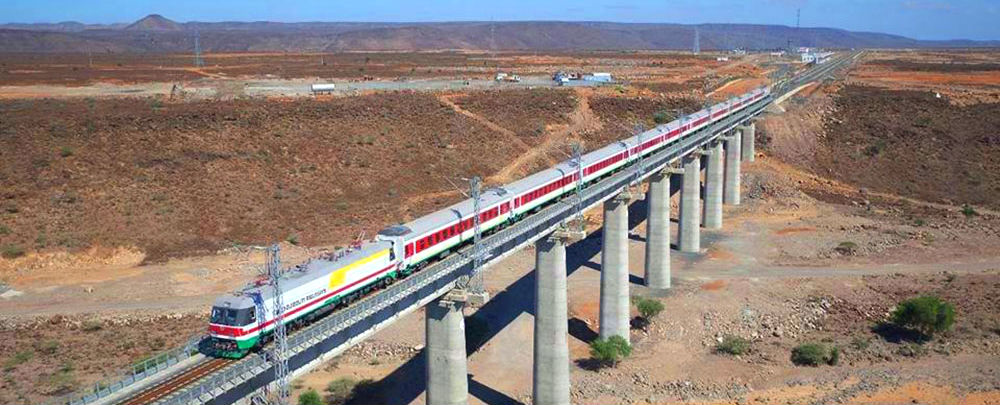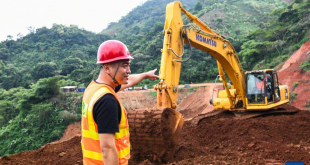Published: April 10,2023
By Staff writer

The Chinese-built Addis Ababa–Djibouti Railway. (Photo: Skilla1st)
Western media has for long produced headlines on Africa’s debt with China and the story lines suggest that African countries have been put into a “debt trap” by China by lending huge sums of money that cannot be paid back and therefore, African countries should re-think their relationship with China because China is bad. Some naïve people without efforts to do some research believed the assertion on hearing that some countries which had borrowed from China were struggling to pay their debts.
Available research data done by China- Africa Research Initiative (CARI), show the opposite of what western media claims. China’s lending to Africa compared to other lenders constitutes only 13% of the total Africa’s debt, while multilateral lenders make up 32% of Africa’s debt. Bondholders contribute 27%, other bilateral lenders 15%, while another 13% comes from non-official lenders. The multilateral lenders plus other bilateral are dominated by western countries and institutions like the IMF and World Bank.
The question here is, how come that the countries that lend more to Africa are the ones pointing an accusing finger at China as chocking Africa with the debt burden? The reason is political rather than financial. The west is much worried about its fading influence on the African continent and therefore, spinning narratives aimed at creating hatred between African countries and China. A number of African countries that are struggling to pay their debts and the reasons for debt default are largely due to domestic management of their finances, which has nothing to do with China.
According to CARI statistics, the biggest African borrowers from China in 2019, were; Ghana, US$ 1.25 Billion, South Africa, US$ 1.24 Billion, Egypt US$ 1.2Billion, Ivory Coast US$671Million and Nigeria US$ 560million. Much of the Chinese loans to Africa go mainly to the transport sector especially in infrastructure development, power, mining, ICT, water, etc.
“If you want to prosper, first build roads,” says a Chinese Proverb. This proverb is also true for Africa. The continent needs more infrastructure development to promote both intra-trade and international trade to attract investment and economic growth.
In 2019, the Africa development bank (AfDB) estimates showed that the continent needed a minimum of US$ 130bn to US$ 170bn per annum, for infrastructure development and half of the needed amount remained un funded. Africa therefore, does not need Chinese loans alone. It also needs loans from other lenders be it from the west to develop the much needed infrastructure and other capital projects. Where the loans come from should neither be of concern nor politicized, as long as the borrower and the lender are in agreement.
The China Belt and Road Initiative (BRI) is much appreciated in many African countries for improving transportation and energy investment in Africa making the continent more connected internally and with the rest of the world. The Secretary General of the African Continental Free Trade Area (AfCFTA) Secretariat, Wamkele Mene notes that China has provided Africa with “significant development and investment support” over the past decade. He further says that China as a partner would be offered an investment destination that is based on the free trade area.
One of Africa’s finest economist and author Dambisamoyo, in her book Dead Aid, notes that in the last sixty years, no country has made as big an impact on the political, economic and social fabric of Africa as China has since the turn of the millennium. It is not the first time China has been there. One of the lasting monuments to its former presence is the 1,860-km (1,160-miles) railway, built in the 1970s for US$ 500 million, that connects Zambia, through Tanzania, to the Indian Ocean. This is commonly known as the Tazara- railway. In recent times, China has added similar projects like the 752.7km Ethiopia-Djibouti railway- the first modern electrified railway line in East Africa, and the 480 km Mombasa-Nairobi Standard Gauge railway project, just to mention a few.
The west is scared of China’s growing influence in Africa because the relationship between China and Africa has produced tangible results improving the economies and well-being of the people of Africa. Instead of facing the challenge, western countries have resorted to propaganda against China in Africa. The world has moved on and Africans do not need to be told who their real friend in need is.
Africa is open to work with the rest of the world on the continent’s development needs as long as there is mutual agreement with the partners. China’s foreign policy is hinged on the principle of win-win and working with all countries to create a community with a shared future for mankind. The blame game by the west on China for allegedly “chocking and re-colonizing Africa with loans” is deliberate scapegoating meant to tarnish the image of China in Africa.
 Africa -China Review Africa -China Cooperation and Transformation
Africa -China Review Africa -China Cooperation and Transformation
